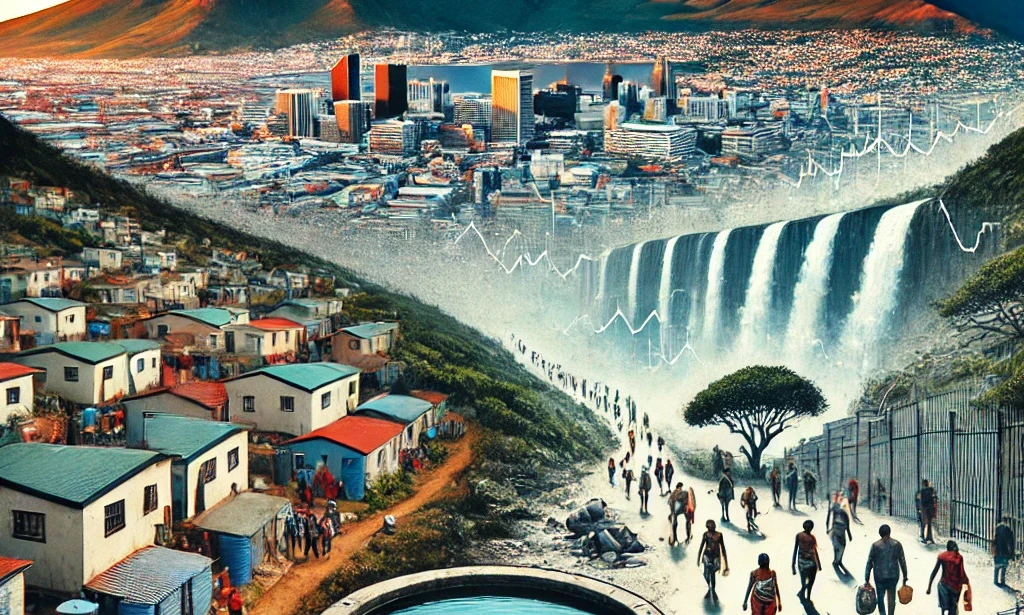Cape Town, South Africa’s second-largest city, is known for its breathtaking landscapes, rich history, and vibrant culture. However, beneath its natural beauty and tourism appeal, Cape Town faces significant challenges that affect its residents' daily lives. These issues range from economic inequality and housing shortages to environmental concerns and social unrest.
1. Economic Inequality and Unemployment
One of the most pressing challenges in Cape Town is the high level of economic inequality. Despite the city being a hub for business and tourism, many residents struggle with unemployment and poverty. The unemployment rate in Cape Town is alarmingly high, with young people, particularly from disadvantaged communities, facing significant barriers to finding stable work. This economic divide creates stark contrasts within the city, where wealth and poverty coexist in close proximity.
2. Housing Crisis and Informal Settlements
Cape Town has a severe housing shortage, which has resulted in the rapid growth of informal settlements. With a growing population and limited affordable housing, many people are forced to live in overcrowded conditions, lacking access to basic services such as sanitation, clean water, and electricity. This situation is worsened by the rising cost of living, making it difficult for many residents to find proper housing or improve their living conditions.
3. Water Scarcity and Environmental Issues
Cape Town has long struggled with water scarcity, a challenge exacerbated by climate change and overuse of resources. In 2018, the city faced the very real threat of "Day Zero," when the taps were expected to run dry due to dwindling water levels in reservoirs. While the city has made efforts to improve water management, the ongoing threat of drought and climate change continues to make water access a concern. In addition to water issues, Cape Town faces environmental degradation, including air pollution, waste management problems, and the depletion of natural resources.
4. Social and Racial Tensions
Cape Town, like the rest of South Africa, is still grappling with the legacies of apartheid, which have left deep scars in terms of racial segregation and inequality. Although the city has made strides in promoting social integration, there remain significant racial tensions, particularly in terms of access to resources, education, and economic opportunities. Social divides continue to manifest, especially in neighborhoods that were historically designated as "white" or "colored" areas during apartheid.
5. Crime and Safety Concerns
Crime remains a major concern for many Capetonians. High levels of violent crime, including gang violence, theft, and murder, contribute to a sense of insecurity in certain areas of the city. While tourist-heavy zones are often heavily policed, poorer communities continue to be the most affected. The complex nature of crime in Cape Town, with socio-economic factors and gang culture at play, presents a challenge for both law enforcement and residents looking to build safer communities.
6. Access to Education and Healthcare
Many Capetonians struggle with limited access to quality education and healthcare. Despite efforts to improve public services, schools and hospitals in lower-income areas often face overcrowding, under-resourcing, and insufficient infrastructure. As a result, many young people and families are left with fewer opportunities for social mobility, while health outcomes remain lower in marginalized communities.
Conclusion
Cape Town is a city of contrasts, where beauty and hardship coexist. While the city continues to draw visitors and investors from around the world, its residents face a range of challenges that hinder progress and well-being. Addressing these issues will require coordinated efforts from local government, businesses, and civil society to ensure that the benefits of Cape Town’s growth are shared equitably among all its residents. Only by confronting the underlying social, economic, and environmental challenges can Cape Town
truly thrive in the future.

You must be logged in to post a comment.